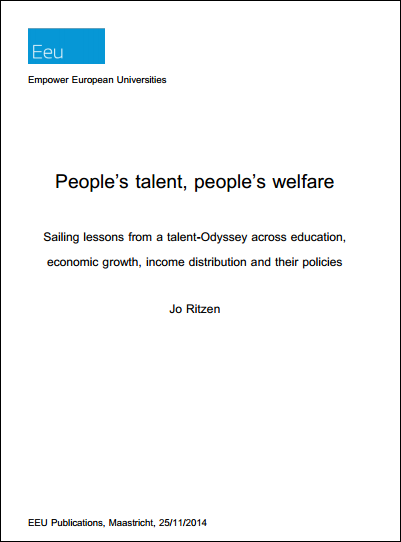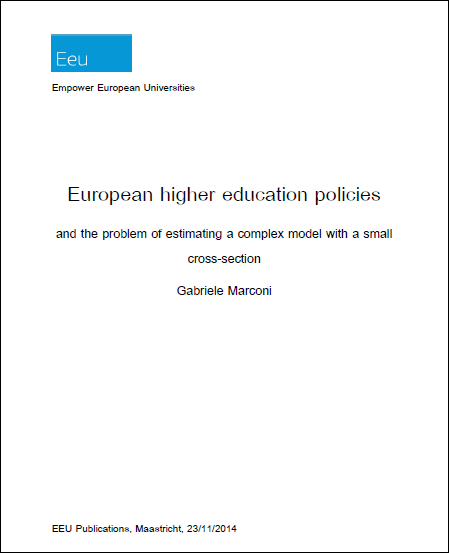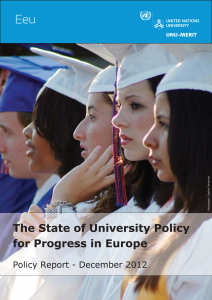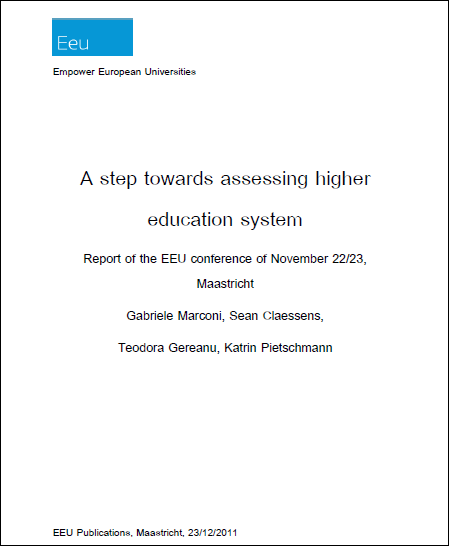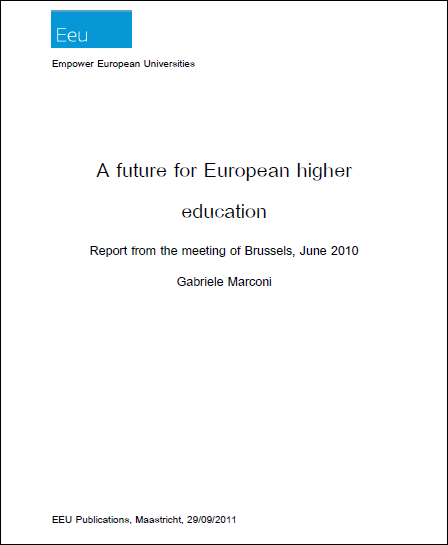EEU Publications
EEU Report 2014: University Policy Needs To Beef Up For Europe To Be More Innovative
J. Ritzen, G. Marconi, S. Sasso
This report repeats the 2012 analysis with the data of two years later and with the assessments of correspondents from the 32 European countries on university policies in the context of university performance and innovation, while deepening the analysis with data on the satisfaction of employers with graduates, and expanding the accounting framework with variables which represent the size and composition of the population.
J. Ritzen
Jo Ritzen, chair of EEU, shares some sailing lessons learned during his long journey in the field of talent development, started as a Professor of Education Economics, and continued as the Minister for Education & Science of the Netherlands, Senior Vice-President of the World Bank, President of Maastricht University, before becoming Professor of International Economics of Science, Technology and Higher Education at UNU-MERIT, Maastricht. Jo Ritzen touches in this lecture, given in occasion of his honorary degree at the University of Ss Cyril and Methodius (Trnava, Slovakia), the themes of education funding and organisation, equality of opportunities, lifetime skills, and the political economy of education.
G. Marconi
This paper investigates the properties of a methodology based on principal components and regression analysis. This methodology, which is used by EEU in its bi-annual report, serves two purposes. On one hand, it makes it possible to explore datasets with many variables but only a small number of observations (such as the international comparative dataset on higher education used by EEU). On the other hand, it makes it possible to produce a score representing the predicted value of economic innovativeness based on the basis of data on higher education policy at the national level. This paper describes this methodology and compares it to some alternatives (ordinary least squares and principal component regression) by means of a Montecarlo simulation.
EEU Report 2012: The State of University Policy for progress in Europe
C. Hoareau, J. Ritzen, G. Marconi
Higher education contributes to economic innovation. This study measures and compares the extent to which national governments’ policies foster this contribution across Europe. The study stresses the relevance of policies which are ‘empowering’ for higher education institutions, or in other words provide them with appropriate resources and regulatory environments.The assessment relies on quantitative scores, based on the contribution of policies regarding funding and autonomy to higher education performance in education, research and economic innovation, using non-arbitrary weights and eighteen policy indicators across 32 European countries. A large number of countries belong to a ‘middle group’ in our overall assessment, indicating a relative cohesion in Europe. Yet, substantial variations exist in terms of higher education policy in Europe, each European country having room for policy improvement.
Annex: Country Reports
G. Marconi, S. Claessens, T. Gereanu, K. Pietschmann
This report presents the debate over the current state, challenges and perspectives of European higher education carried out by highly recognized experts in the field on November 22nd and 23rd in Maastricht (NL). The debate focused on the role that the not for profit, non-governmental organization Empower European Universities (EEU), based in Maastricht, can have in the process of giving European higher education institutions the means to contribute to a more creative and inclusive European society. EEU aims to evaluate national university policies periodically and to foster better, more rigorous evidence based policy-making across Europe. It will monitor the reform process all around Europe and feed into it new ideas, contributing to the Europeanization of higher education.
A future for European higher education: Report from the meeting of Brussels, June 2010
G. Marconi
This report reviews the current state of higher education in Europe and formulates policy recommendations. It is based on the discussions at a meeting held in June 2010 in Brussels. The participants were experts in higher education (former ministers for education, professors and researchers, leaders of universities, national university associations or other institutions). The participants to the meeting drafted and signed a manifesto which will become the basis for the efforts of EEU (Empower European Universities) to improve European and national policies on higher education.
Jo Ritzen “A Chance for European Universities”
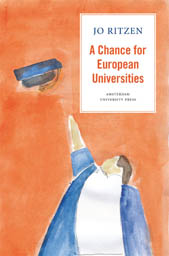
Europe’s universities are very well represented among the world’s top 200 universities, but almost absent in the top 50. They are economically, culturally and socially underexploited. There is an urgent need to alter the context for European universities to strengthen the European competitive position through economic innovation, increased social cohesion and a more vibrant cultural dynamism.
The unbalanced demographics in the world – with a virtually constant supply of graduates in the developed West and a potentially fast increase in the number of graduates in developing countries – pose both new threats and new opportunities for European universities.
Europe can cash in on these opportunities by reinventing its higher education, taking into account the lessons learned from effective education for an international labor market, from the valorization of knowledge but also from the matching and selection of students.
Jozef Ritzen outlines a series of changes necessary to make European universities more successful:
- Denationalization of the Bologna process with emphasis on European-wide accreditation and quality control;
- Moving the organization of universities from the bureaucratic to the innovative;
- Rebalancing the financing system so that the public budget cuts of the past decades can be met by private sources.


